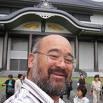The Gift of Rice
- Hakumai Ippyo Gosho -
I have received the sack of rice, the sack of taro and the basket of river-plants which you were so
good as to send me by your servants.
Man has two kinds of treasure: clothing and food. One sutra states, "All sentient beings live on food."
Man depends on food and clothing to survive in this world. For fish, water is the greatest treasure and for trees, the soil
in which they grow. Man's life is sustained by what he eats. That is why food is his treasure.
However, life itself is the most precious of all treasures. Even the treasures of the entire universe
cannot equal the value of a single human life. Life is like a lamp, and food like oil. When the oil is gone, the flame will
die out, and without food, life will cease.
People place the word "Nam" before the names of all deities and Buddhas in worshiping them. But what
is the meaning of "Nam"? This word derives from Sanskrit, and means to devote one's life. Ultimately it means to offer our
lives to the Buddha. Some may have wives, children, retainers, estates, gold, silver or other treasures according to their
status. Others have nothing at all. Yet whether one has wealth or not, life is still the most precious treasure. This is why
the saints and sages of ancient times offered their lives to the Buddha, and were themselves able to attain Buddhahood.
Sessen Doji offered his body to a demon to receive a teaching composed of eight characters. Bodhisattva
Yakuo, having no oil, burned his elbow as an offering to the Lotus Sutra. In our own country, Prince Shotoku peeled off the
skin of his hand on which to copy the Lotus Sutra, and Emperor Tenji burned his third finger as an offering to Shakyamuni
Buddha. Such austere practices are for saints and sages, but not for ordinary people.
Yet even common mortals can attain Buddhahood if they cherish one thing: earnest faith. In the deepest
sense, earnest faith is the will to understand and live up to the spirit, not the words, of the sutras. What does this mean?
In one sense, it means that offering one's only robe to the Lotus Sutra is equivalent to tearing off one's own skin, and in
a time of famine, offering the Buddha the single bowl of rice on which one's life depends is to dedicate one's life to the
Buddha. The blessings of such dedication are as great as those Bodhisattva Yakuo received by burning his own elbow, or Sessen
Doji by offering his flesh to a demon.
Therefore, saints consecrated themselves by offering their own bodies, whereas common mortals may consecrate
themselves by the sincerity with which they give. The precept of donation expounded in the seventh volume of the Maka Shikan
in effect teaches the spirit of offering.
The true path of life lies in the affairs of this world. The Konkomyo Sutra reads, "To have a profound
knowledge of this world is itself Buddhism." The Nirvana sutra reads, "All scriptures or teachings, from whatever source,
are ultimately the revelation of Buddhist truth."
In contrast, the sixth volume of the Lotus Sutra reads, "No affairs of life or work are in any way different
from the ultimate reality." In discussing the underlying significance of these quotations, Miao-lo taught that the first two
sutras are profound, but still shallow when compared to the Lotus Sutra. Whereas they relate secular matters in terms of Buddhism,
the Lotus Sutra explains that secular matters ultimately are Buddhism.
The sutras which came before the Lotus Sutra taught that all phenomena derive from one's mind. The mind
is like the earth, and phenomena are like the plants growing in the earth. But the Lotus Sutra teaches that the mind is one
with the earth and the earth is one with its plants. The provisional sutras say that a tranquil mind is like the moon and
a pure heart is like a flower, but the Lotus Sutra states that the flower and moon are themselves heart and mind. Therefore,
it is obvious that rice is not merely rice but life itself.
Because the regent would not taste the sumptuous food [of true Buddhism], there was nothing more I could
do, and so I retired to the forest. I am an ordinary man and find it hard to endure the winter's cold or the summer's heat.
Nor do I have enough to eat. I could never match the feat of the man said to have walked ten thousand ri on a single meal,
or that of Confucius and his grandson, who ate only nine meals in one hundred days. Without food, I could not long continue
to recite the sutra or concentrate on meditation.
Thus, your offerings are more than mere gifts. Perhaps the Lord Buddha himself advised you to care for
me, or it might be that your karma from the past has impelled you to do so. It is impossible to say all I want to in this
letter.
With my deep respect.

